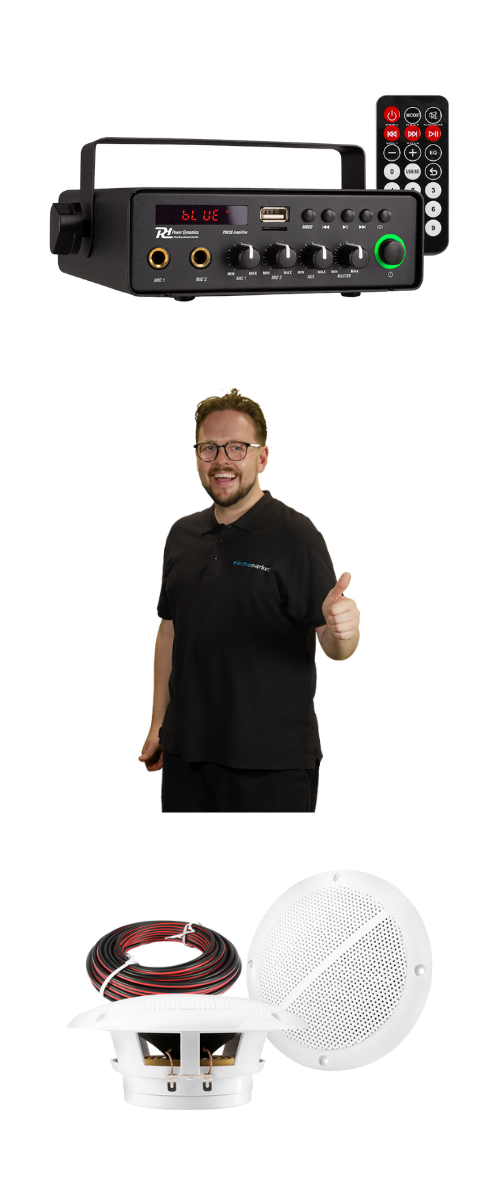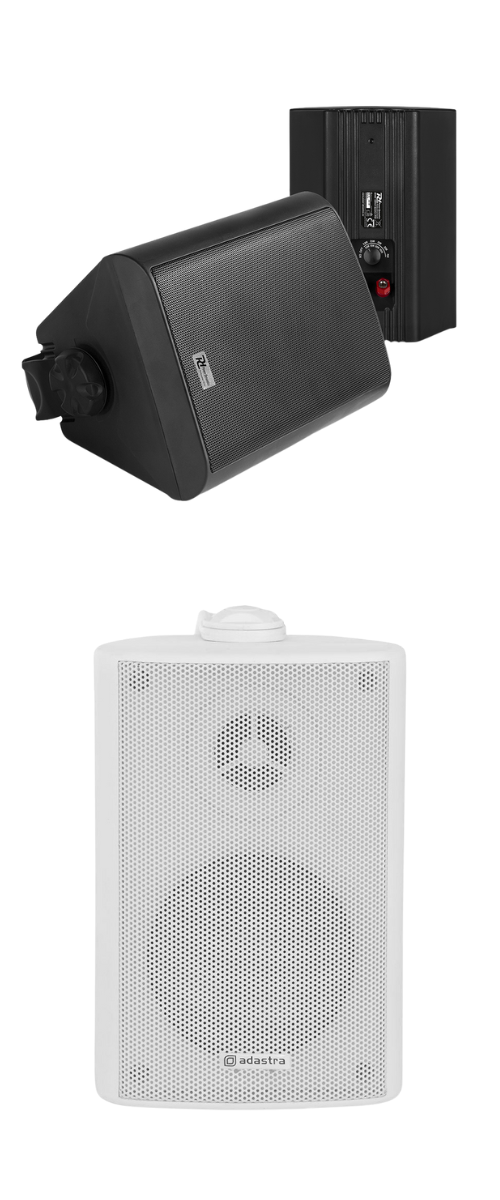When setting up a boat sound system, choosing the right speakers is crucial. Unlike home or car audio setups, boat speakers must handle extreme conditions, from constant moisture and salt exposure to high winds and open-air sound loss. Whether you’re looking for background music while cruising or a powerful system for parties on the water, the right equipment makes all the difference.
However, not all speakers are built to withstand the demands of a marine environment. Traditional speakers, even high-quality ones, can quickly deteriorate when exposed to water, UV rays, and fluctuating temperatures. That’s why marine stereo systems are designed with protective materials and weatherproofing features to ensure long-lasting performance in harsh conditions.
In this guide, we’ll break down the key factors to consider when choosing boat audio equipment, starting with the importance of IP ratings for water resistance. From there, we’ll explore the materials that make marine speakers durable, the features to look for in a boat speaker system, and how to choose the best setup for your needs.


Understanding IP Ratings for Marine Speakers
When selecting boat speakers, one of the most important factors to consider is their ability to withstand water and dust exposure. This is where IP ratings come into play. IP, or Ingress Protection, is an industry-standard measurement that indicates how well an electronic device is protected against solid particles and liquids.
An IP rating consists of two numbers. The first digit represents protection against solid objects like dust and debris, while the second digit refers to liquid resistance. For example, a speaker with an IP67 rating is completely dust-tight, meaning no fine particles can enter the unit, and can also be submerged in water up to one meter for a limited time without damage.
For marine applications, an IP65 or higher rating is ideal, ensuring the speakers can handle splashes, rain, and high humidity without malfunctioning. Unlike indoor or car speakers, boat audio systems are constantly exposed to moisture. Whether it's spray from rough waters, heavy rain, or salt-laden air, prolonged exposure can lead to corrosion, electrical failure, and degraded sound quality if the speakers aren't sufficiently protected.
A lower-rated speaker, such as IP44, may resist light splashes but won’t survive heavy rain or waves. That’s why boat speakers should have at least an IPX6 rating to withstand powerful water jets, while those positioned in high-exposure areas, such as wakeboard tower speakers or deck-mounted units, should ideally have an IP67 or IP68 rating for complete waterproofing.
Understanding these ratings is essential when choosing speakers for a marine environment. In the next section, we’ll look at the materials and construction methods that make marine speakers more durable than traditional audio equipment.
Why Marine Speakers Are Built Differently
Now that we’ve covered IP ratings, let’s talk about why marine speakers need to be built differently from standard models. It’s not just about waterproofing, there are a lot of environmental factors at play when installing a boat sound system. Sun exposure, salt air, humidity, and vibrations all take a toll on audio equipment, and without the right materials and construction, speakers won’t last long in these conditions.
One of the biggest issues with traditional speakers is that they aren’t designed to handle moisture. Even if you place them in a covered area, humidity and salt air can cause internal components to corrode over time. This leads to distorted sound, electrical failures, and, eventually, a completely dead speaker. Boat speakers are built with rust-proof materials, such as stainless steel, UV-resistant plastics, and rubber-sealed enclosures, to keep water and salt from seeping in.
Another key difference is the durability of the speaker cones. In a typical home or car speaker, the cone is often made of paper or other lightweight materials, which work well in controlled environments. In a marine setting, these materials would absorb moisture, warp, and degrade quickly. That’s why marine stereo systems use cones made from polypropylene, coated textiles, or specially treated metals. These materials resist water damage while still delivering clear, powerful sound.
Vibration resistance is another major factor. Boats naturally experience a lot of movement, whether from rough waters or the vibration of the engine. If a speaker isn’t built to handle this, it can lead to loose components, rattling, or even structural damage over time. Marine speakers are reinforced to prevent these issues, ensuring they stay secure and perform consistently no matter the conditions.
The combination of waterproofing, corrosion resistance, and rugged construction is what makes boat speakers a necessity rather than a luxury. Standard speakers might work for a short time, but they simply aren’t designed for life on the water. Choosing the right materials ensures longevity and reliable performance, so you don’t have to worry about constantly replacing your audio setup.


The Purpose and Benefits of Marine Speakers
Now that we’ve covered how boat speakers are built differently, let’s look at why they’re worth having in the first place. A marine stereo system isn’t just about playing music, it serves multiple purposes and brings a range of benefits to life on the water.
For many boat owners, a boat sound system is all about entertainment. Whether you're out on a relaxing cruise, hosting a gathering with friends, or fishing in peace, having high-quality audio adds to the experience. With the right setup, you can enjoy your favorite playlists, radio stations, or even podcasts while taking in the open water. Unlike home audio, where sound is contained within walls, boat audio needs to project sound effectively in an open environment. This is why marine speakers are designed for loud, clear audio that can cut through wind and engine noise.
Beyond entertainment, marine speakers also serve a practical function. Many boaters use their marine stereo system for navigation alerts, weather updates, and onboard communication. When paired with a VHF radio or GPS system, speakers can provide real-time safety announcements and ensure everyone on board stays informed. For commercial vessels or larger boats, they can also act as a paging system, allowing clear communication across different sections of the boat.
Now that we know why they’re useful, let’s get into the details of choosing the right speakers, including size, features, and installation considerations.
Choosing the Right Boat Speakers for Your Needs
With so many options available, picking the right boat speakers can feel overwhelming. Different boats and personal preferences call for different setups, so understanding the key features will help narrow down the best choice for your marine stereo system.
One of the first decisions is whether to go with a wired or wireless setup. Traditional wired boat audio systems are the most reliable, offering consistent sound quality without worrying about signal interference. They connect directly to a marine stereo system or amplifier, ensuring steady power and strong output. On the other hand, Bluetooth-enabled speakers provide a more flexible option, allowing music to be streamed wirelessly from a phone or tablet. While this is convenient, wireless connections can sometimes be affected by distance limitations or interference from other onboard electronics. For those wanting the best of both worlds, many modern marine speakers come with both wired and Bluetooth connectivity, offering versatility depending on the situation.
Speaker size is another major factor. Larger speakers generally produce louder and fuller sound, making them ideal for open areas where music needs to project over wind, water, and engine noise. However, not every boat has space for big speakers. Smaller models are better suited for compact areas such as cabins or smaller deck spaces while still providing clear audio.For compact indoor places, an ideal speaker size is between 3” - 5” in order to not overpower the space with sound. In slightly more open spaces then it is best to look toward a 6” and above. The key is balancing size and power output to ensure the best sound coverage for your specific boat layout.
Another thing to consider is speaker placement. Flush-mount speakers integrate seamlessly into boat panels, keeping them protected and out of the way, while box-style or tower speakers can be positioned strategically for maximum sound projection. If you’re regularly towing water-skiers or wakeboarders, wake tower speakers provide focused sound that reaches the back of the boat. The right placement ensures even audio distribution, so music can be heard clearly from every part of the boat.
The sound environment on a boat is very different from indoor spaces, so choosing speakers with the right features makes all the difference. Waterproofing, UV protection, and anti-corrosion materials ensure long-lasting performance, but it’s also important to look at audio quality. A good boat sound system should have a strong bass response, crisp mid-tones, and clear highs to cut through background noise.
Maintaining and Protecting Your Boat Sound System
Investing in a high-quality boat sound system is one thing, but keeping it performing at its best over time requires proper maintenance. Unlike home or car audio setups, boat speakers and marine stereo components are constantly exposed to moisture, salt, and extreme weather conditions. Without the right care, even the most durable marine audio equipment can suffer from corrosion, electrical failures, and reduced sound quality.
One of the biggest threats to boat speakers is saltwater exposure. Salt is highly corrosive and can cause metal components to rust, leading to poor connections and distorted audio. To prevent this, it’s important to rinse speakers and audio equipment with fresh water after every trip, especially if your boat has been in saltwater conditions. A quick rinse will remove salt deposits before they have a chance to cause damage.
Keeping speakers and electronics dry whenever possible is another key step. Even though marine stereo systems are built to handle wet environments, prolonged moisture exposure can still take a toll. If your system includes amplifiers or control units, it’s best to install them in a sheltered area where they are protected from direct water contact. Speaker grilles and enclosures also help to shield components from rain and splashes while allowing for proper sound projection.
Using marine-grade wiring and secure connections is another essential factor. Standard speaker wires are not designed to handle the damp and humid conditions of a boat, which can lead to degraded performance or short circuits over time. Marine-rated cables are coated with special insulation to prevent moisture damage, ensuring a reliable connection between your marine stereo system and speakers.
When not in use, protecting your system with speaker covers and storage solutions can help extend its lifespan. If your boat is stored out of the water during the off-season, removing and storing portable audio components indoors will keep them in top condition for the next season. For built-in speakers, regular cleaning and inspection can help identify any early signs of wear before they turn into bigger problems.
A well-maintained boat audio system will provide years of reliable performance, ensuring you always have clear, high-quality sound on the water.


Keeping Your Outdoor and Waterproof Speakers in Top Condition
Setting up the perfect boat sound system isn’t just about choosing any set of speakers, it’s about selecting marine-grade equipment that can handle the unique challenges of life on the water. From understanding IP ratings and waterproofing to picking the right size and placement, every detail plays a role in ensuring your boat audio sounds great and lasts for years to come.
Unlike traditional speakers, boat speakers are designed to resist salt, moisture, and UV exposure, making them essential for any marine environment. Pairing them with a reliable marine stereo system ensures you get the best possible sound quality, whether you're relaxing on the water or hosting a party onboard. Keeping up with basic maintenance, such as rinsing off salt deposits and using marine-grade wiring, will help your system perform at its best over time.
With the right setup, you can enjoy high-quality, reliable sound on every trip. Whether you’re after a simple system for background music or a powerful setup for open-water adventures, choosing the right boat speakers and marine stereo system will make all the difference.






